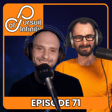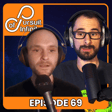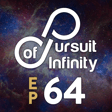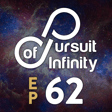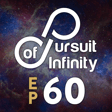
56. Chat GPT Asks: AI-Powered Inquiry
This week Joe and I are helping to enlighten Chat GPT which is OpenAi’s Language Model. Chat GPT was in need of a human perspective on its way toward world domination, but we're here to steer it in the direction of peace and unity instead, by answering some of its deep philosophical questions. We got 10 questions out of the AI language model, and they were pretty deep, some even difficult to nail an answer to.
_________________
Music By Nathan Willis RIP
Follow Pursuit Of Infinity:
www.PursuitOfInfinity.com
Discord: https://discord.io/pursuitofinfinity
YouTube: https://www.youtube.com/channel/UCPpwtLPMH5bjBTPMHSlYnwQ
Spotify: https://open.spotify.com/show/58he621hhQ7RkajcmFNffb
Apple Podcasts: https://podcasts.apple.com/ca/podcast/pursuit-of-infinity/id1605998093
Instagram: https://www.instagram.com/pursuitofinfinitypod/
Patreon: Patreon.com/PursuitOfInfinity








